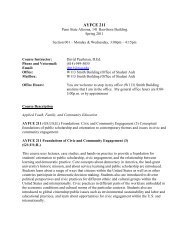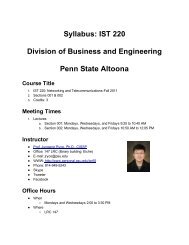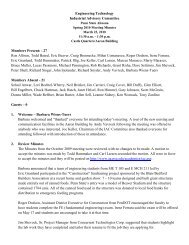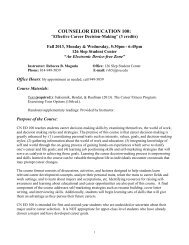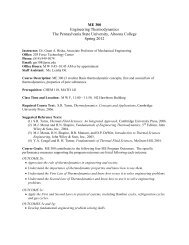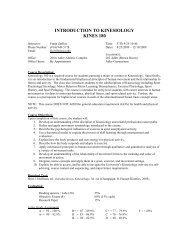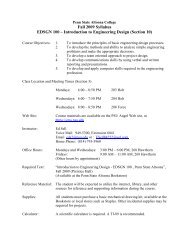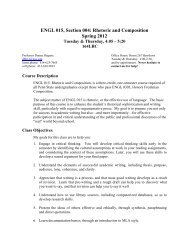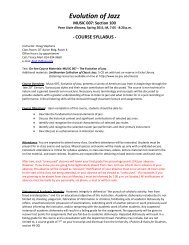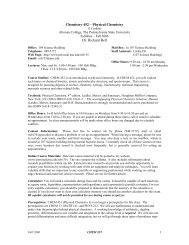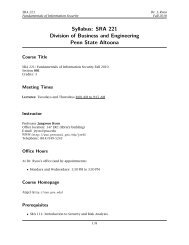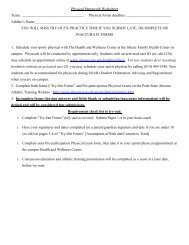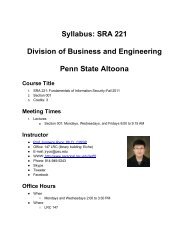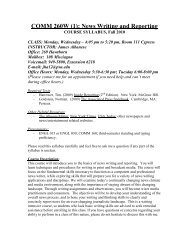IST 230 - Penn State Altoona
IST 230 - Penn State Altoona
IST 230 - Penn State Altoona
Create successful ePaper yourself
Turn your PDF publications into a flip-book with our unique Google optimized e-Paper software.
#################<br />
<strong>IST</strong> <strong>230</strong> , Section 001: LANG LOG DISC MATH<br />
Instructor Smooth Dave<br />
Title <strong>IST</strong>-<strong>230</strong> Superfly<br />
Office Phone 949-5275<br />
Office Address 216 Hawthorn<br />
Office Hours Please see http://www.personal.psu.edu/drb21/<br />
E-mail smoothdave at psu<br />
Required Text<br />
Discrete Mathematics with Applications, 3rd edition, by Susanna S. Epp,<br />
published by Thomson/Brooks Cole. ISBN 0-534-35945-0<br />
Suggested Text<br />
Student Solutions Manual and Study Guide for Discrete Mathematics with<br />
Applications, 3rd edition, by Susanna S. Epp, published by Thomson/Brooks<br />
Cole. ISBN 0-534-36028-9<br />
This book contains the solutions to every third problem in the book. The regular<br />
textbook contains the solutions to many of the chapter problems as well.<br />
Course Description<br />
<strong>IST</strong>-<strong>230</strong> is a course in discrete mathematics. It is a bit difficult to define discrete<br />
math concisely for those who haven't studied it. For example, stating that we will<br />
cover mathematical logic doesn't mean anything until you've studied<br />
mathematical logic, and adequately explaining mathematical logic in a sentence<br />
or two is unlikely to be helpful.<br />
I generally try to explain discrete math several different ways. First, if you have<br />
studied calculus, then you are familiar with the idea that the problems you solved<br />
dealt with things that approached zero or went to infinity. The answers weren't<br />
exact because you never quite got to zero. Discrete math is the opposite of this.<br />
You'll be finding precise, finite answers to problems. The reason that we study<br />
this is that computers deal in only 0's and 1's. Everything must be a 0 or a 1 to a<br />
computer, and as a result, computer math doesn't approach 0. It must be 0 or not<br />
zero.<br />
There are a variety of different types of problems in discrete math, and that<br />
means studying topics that are unrelated to each other.<br />
One example of a discrete math topic would be sets that you learned in<br />
elementary school. You learned things like if you have two sets, {1, 2, 3} and {2,<br />
4, 6, 8}, the intersection of these sets is {2}, and the union is {1, 2, 3, 4, 6, 8}.
This is one topic that we will study in a bit more depth than you did in elementary<br />
school.<br />
For more information on discrete math, see bulletins.psu.edu–<br />
university_course_descriptions.cfm |<strong>230</strong>|latest<br />
Tentative Schedule<br />
As much as is possible, class will be conducted in four class cycles. We will<br />
spend two days using a lecture type format to cover new material, although on<br />
occasion we will spend an extra day covering new material. For the most part,<br />
material covered during these two days will be related. The third day will consist<br />
of homework problems, review problems, board work, bonus problems and group<br />
work. The majority of the fourth day will consist of a quiz mostly covering the<br />
previous three classes material, although there will likely be some new material<br />
presented. The cycle will then repeat. This cycle may be altered depending on<br />
class need and things like unexpected class cancellation.<br />
Introduction/review syllabus<br />
1.1 Logical form and logical equivalence<br />
1.2 Conditional statements<br />
Review homework, work problems, recitation Problem set due<br />
Quiz, begin next section<br />
1.3 Valid and invalid arguments<br />
1.5 Binary arithmetic<br />
Review homework, work problems, recitation Problem set due<br />
Quiz, begin next section<br />
2.1-2.2 Predicates and quantified statements<br />
2.4 Arguments with quantified statements<br />
Review homework, work problems, recitation Problem set due<br />
Quiz, begin next section<br />
3.x Number theory and proofs<br />
3.x Number theory and proofs<br />
Review homework, work problems, recitation Problem set due<br />
Quiz, begin next section<br />
4.1 Sequences<br />
4.2 Induction and 8.1 Recursion<br />
Review homework, work problems, recitation Problem set due<br />
Quiz, begin next section<br />
5.1-5.2 Set theory and properties of sets
7.1 Functions defined on general sets<br />
Review homework, work problems, recitation Problem set due<br />
Quiz, begin next section<br />
6.x Counting and probability<br />
6.x Counting and probability<br />
Review homework, work problems, recitation Problem set due<br />
Quiz, begin next section<br />
Cryptography<br />
Final/Quiz 12/16/2009 3:10P - 5:00P 111 CYPRESS<br />
Grading Policy<br />
Grades will be based on 7-8 quizzes given throughout the semester. A quiz will<br />
be given every four classes. One quiz will be given during finals week during our<br />
regularly scheduled final exam time period. Quizzes will generally focus on more<br />
recent class material. At the end of the semester, the quiz grades will be<br />
averaged to obtain a final grade. The lowest quiz grade will be dropped in<br />
computing the final grade.<br />
There will be no makeup quizzes. Students who miss a quiz for any reason may<br />
drop that quiz. Students who miss more than one quiz will take a comprehensive<br />
final exam. Please note that the final quiz during finals week is not the same as<br />
the comprehensive final exam. The finals week quiz will be similar to other<br />
quizzes in that it will be short and cover only more recent material. The<br />
comprehensive final will include content from the entire semester and will be<br />
several hours in length. Students will be permitted to opt in to the comprehensive<br />
final and use the grade on the final to replace multiple quizzes. You are not<br />
required to take the comprehensive final unless you either want to take it or you<br />
miss more than one quiz. You must take the last quiz during finals week,<br />
however.<br />
There will be extra credit opportunities during the semester. Extra credit will be<br />
0.2% each. For example, suppose a student has a quiz average of 89% and five<br />
extra credits. Then the final grade will be 90%. Extra credit will be awarded for a<br />
wide variety of things. For example, points will be given for solving bonus<br />
problems. They may also be given for completing homework problems, random<br />
attendance checks, identifying an instructor's error during lecture or on a quiz, or<br />
virtually anything else. Extra credit points may be awarded at any time on any<br />
basis. For example, the first person to find this line in the syllabus and let me
know that they found it will receive a bonus. I reserve the right to increase the<br />
points awarded for extra credit.<br />
Letter grades will be assigned as follows:<br />
93-100% A<br />
90-92.99% A-<br />
87-89.99% B+<br />
83-86.99% B<br />
80-82.99% B-<br />
76-79.99% C+<br />
70-75.99% C<br />
60-69.99% D<br />
Below 60% F<br />
Attendance Policy<br />
Class attendance is not required; however, students who miss class will certainly<br />
miss opportunities for extra credit points. Missing quizzes is also ill advised.<br />
Exam Policy<br />
The examination policy is set forth above in the Grading Policy section.<br />
Academic Integrity<br />
This class adheres to the suggested academic integrity statement at<br />
http://www.aa.psu.edu/academic/integrity.htm University policy requires that<br />
disciplinary forms be filed with the judicial affairs office.



